Business Ethics and Corporate Social Responsibilities Essay Analysis
VerifiedAdded on 2022/11/13
|8
|1979
|328
Essay
AI Summary
This essay delves into the realm of business ethics and corporate social responsibilities, specifically examining the arguments surrounding inheritance. The essay begins by introducing Haslett's proposal, which critiques the justification of inheritance within a capitalist system characterized by wealth inequality. The student's work then dissects Haslett's views, analyzing his perspective on capitalism, equality of opportunity, and freedom. The essay explores the ethical and economic implications of inheritance, including its impact on productivity, discrimination, and moral rights. It evaluates different viewpoints, such as utilitarian, libertarian, and Rawlsian perspectives, regarding inheritance and its regulation. The essay concludes by comparing Haslett's proposal with the current tax system, expressing a preference for the existing system due to its perceived fairness and freedom. Throughout the essay, the student provides a comprehensive analysis of inheritance, its ethical dimensions, and its relationship to business practices.
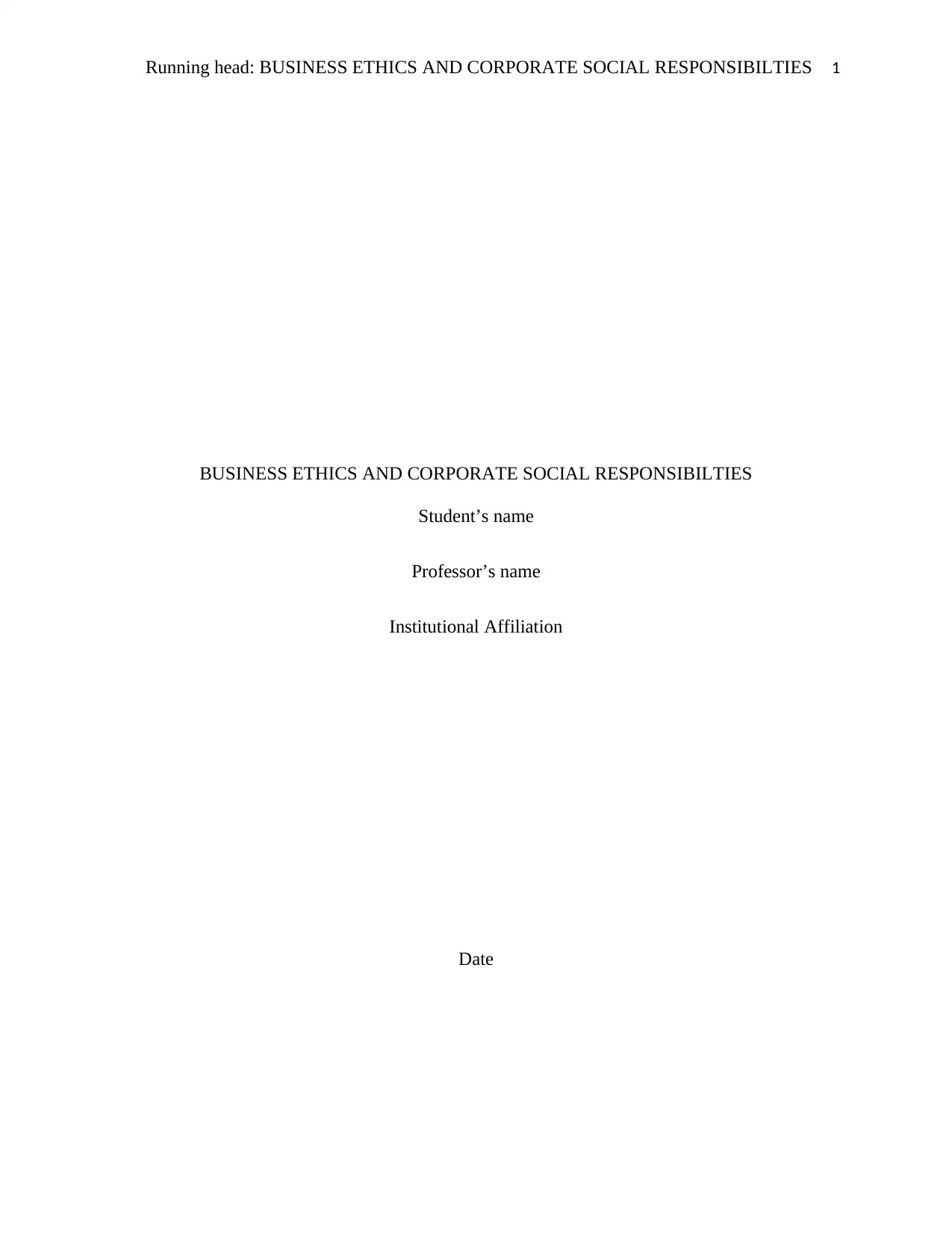
Running head: BUSINESS ETHICS AND CORPORATE SOCIAL RESPONSIBILTIES 1
BUSINESS ETHICS AND CORPORATE SOCIAL RESPONSIBILTIES
Student’s name
Professor’s name
Institutional Affiliation
Date
BUSINESS ETHICS AND CORPORATE SOCIAL RESPONSIBILTIES
Student’s name
Professor’s name
Institutional Affiliation
Date
Paraphrase This Document
Need a fresh take? Get an instant paraphrase of this document with our AI Paraphraser
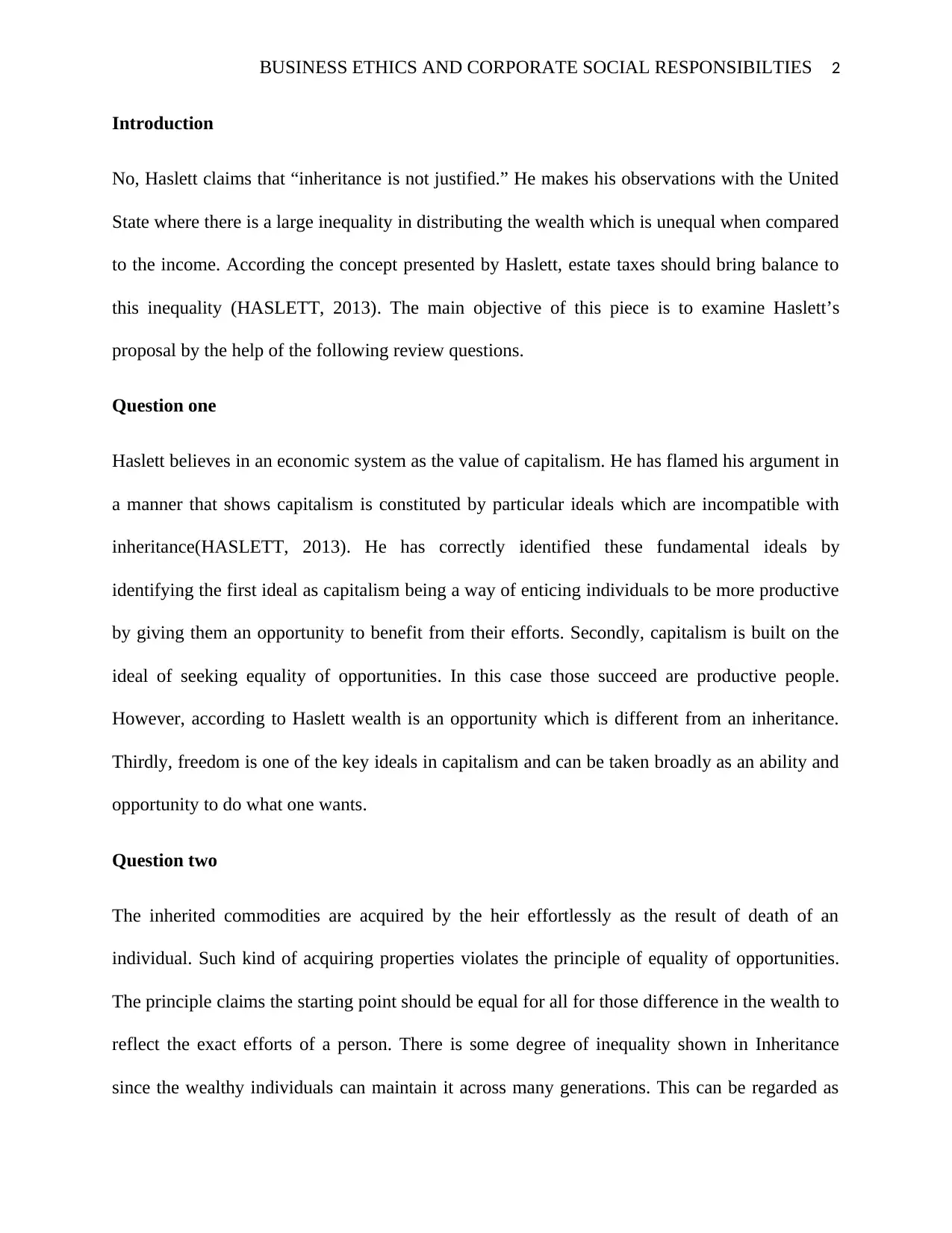
BUSINESS ETHICS AND CORPORATE SOCIAL RESPONSIBILTIES 2
Introduction
No, Haslett claims that “inheritance is not justified.” He makes his observations with the United
State where there is a large inequality in distributing the wealth which is unequal when compared
to the income. According the concept presented by Haslett, estate taxes should bring balance to
this inequality (HASLETT, 2013). The main objective of this piece is to examine Haslett’s
proposal by the help of the following review questions.
Question one
Haslett believes in an economic system as the value of capitalism. He has flamed his argument in
a manner that shows capitalism is constituted by particular ideals which are incompatible with
inheritance(HASLETT, 2013). He has correctly identified these fundamental ideals by
identifying the first ideal as capitalism being a way of enticing individuals to be more productive
by giving them an opportunity to benefit from their efforts. Secondly, capitalism is built on the
ideal of seeking equality of opportunities. In this case those succeed are productive people.
However, according to Haslett wealth is an opportunity which is different from an inheritance.
Thirdly, freedom is one of the key ideals in capitalism and can be taken broadly as an ability and
opportunity to do what one wants.
Question two
The inherited commodities are acquired by the heir effortlessly as the result of death of an
individual. Such kind of acquiring properties violates the principle of equality of opportunities.
The principle claims the starting point should be equal for all for those difference in the wealth to
reflect the exact efforts of a person. There is some degree of inequality shown in Inheritance
since the wealthy individuals can maintain it across many generations. This can be regarded as
Introduction
No, Haslett claims that “inheritance is not justified.” He makes his observations with the United
State where there is a large inequality in distributing the wealth which is unequal when compared
to the income. According the concept presented by Haslett, estate taxes should bring balance to
this inequality (HASLETT, 2013). The main objective of this piece is to examine Haslett’s
proposal by the help of the following review questions.
Question one
Haslett believes in an economic system as the value of capitalism. He has flamed his argument in
a manner that shows capitalism is constituted by particular ideals which are incompatible with
inheritance(HASLETT, 2013). He has correctly identified these fundamental ideals by
identifying the first ideal as capitalism being a way of enticing individuals to be more productive
by giving them an opportunity to benefit from their efforts. Secondly, capitalism is built on the
ideal of seeking equality of opportunities. In this case those succeed are productive people.
However, according to Haslett wealth is an opportunity which is different from an inheritance.
Thirdly, freedom is one of the key ideals in capitalism and can be taken broadly as an ability and
opportunity to do what one wants.
Question two
The inherited commodities are acquired by the heir effortlessly as the result of death of an
individual. Such kind of acquiring properties violates the principle of equality of opportunities.
The principle claims the starting point should be equal for all for those difference in the wealth to
reflect the exact efforts of a person. There is some degree of inequality shown in Inheritance
since the wealthy individuals can maintain it across many generations. This can be regarded as
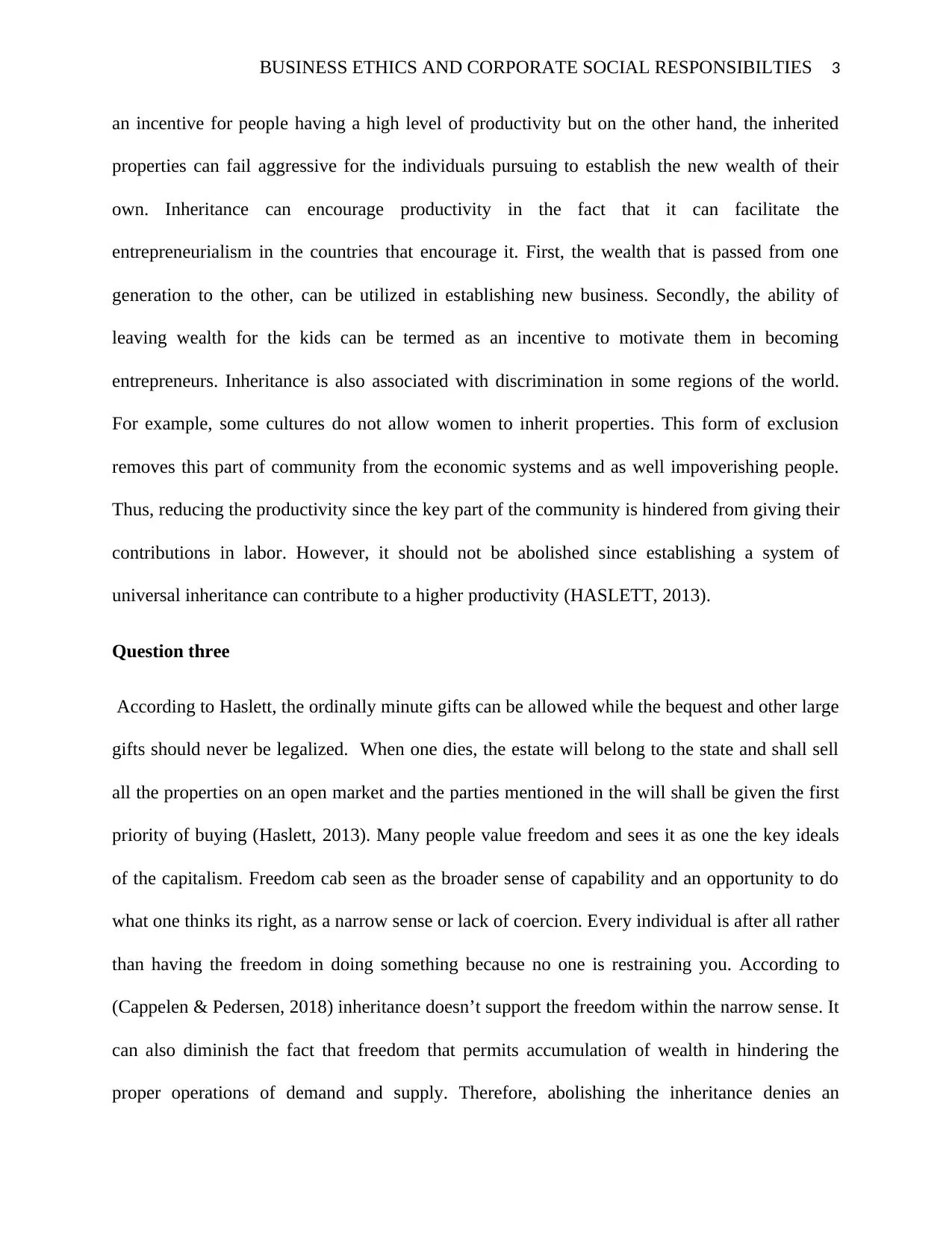
BUSINESS ETHICS AND CORPORATE SOCIAL RESPONSIBILTIES 3
an incentive for people having a high level of productivity but on the other hand, the inherited
properties can fail aggressive for the individuals pursuing to establish the new wealth of their
own. Inheritance can encourage productivity in the fact that it can facilitate the
entrepreneurialism in the countries that encourage it. First, the wealth that is passed from one
generation to the other, can be utilized in establishing new business. Secondly, the ability of
leaving wealth for the kids can be termed as an incentive to motivate them in becoming
entrepreneurs. Inheritance is also associated with discrimination in some regions of the world.
For example, some cultures do not allow women to inherit properties. This form of exclusion
removes this part of community from the economic systems and as well impoverishing people.
Thus, reducing the productivity since the key part of the community is hindered from giving their
contributions in labor. However, it should not be abolished since establishing a system of
universal inheritance can contribute to a higher productivity (HASLETT, 2013).
Question three
According to Haslett, the ordinally minute gifts can be allowed while the bequest and other large
gifts should never be legalized. When one dies, the estate will belong to the state and shall sell
all the properties on an open market and the parties mentioned in the will shall be given the first
priority of buying (Haslett, 2013). Many people value freedom and sees it as one the key ideals
of the capitalism. Freedom cab seen as the broader sense of capability and an opportunity to do
what one thinks its right, as a narrow sense or lack of coercion. Every individual is after all rather
than having the freedom in doing something because no one is restraining you. According to
(Cappelen & Pedersen, 2018) inheritance doesn’t support the freedom within the narrow sense. It
can also diminish the fact that freedom that permits accumulation of wealth in hindering the
proper operations of demand and supply. Therefore, abolishing the inheritance denies an
an incentive for people having a high level of productivity but on the other hand, the inherited
properties can fail aggressive for the individuals pursuing to establish the new wealth of their
own. Inheritance can encourage productivity in the fact that it can facilitate the
entrepreneurialism in the countries that encourage it. First, the wealth that is passed from one
generation to the other, can be utilized in establishing new business. Secondly, the ability of
leaving wealth for the kids can be termed as an incentive to motivate them in becoming
entrepreneurs. Inheritance is also associated with discrimination in some regions of the world.
For example, some cultures do not allow women to inherit properties. This form of exclusion
removes this part of community from the economic systems and as well impoverishing people.
Thus, reducing the productivity since the key part of the community is hindered from giving their
contributions in labor. However, it should not be abolished since establishing a system of
universal inheritance can contribute to a higher productivity (HASLETT, 2013).
Question three
According to Haslett, the ordinally minute gifts can be allowed while the bequest and other large
gifts should never be legalized. When one dies, the estate will belong to the state and shall sell
all the properties on an open market and the parties mentioned in the will shall be given the first
priority of buying (Haslett, 2013). Many people value freedom and sees it as one the key ideals
of the capitalism. Freedom cab seen as the broader sense of capability and an opportunity to do
what one thinks its right, as a narrow sense or lack of coercion. Every individual is after all rather
than having the freedom in doing something because no one is restraining you. According to
(Cappelen & Pedersen, 2018) inheritance doesn’t support the freedom within the narrow sense. It
can also diminish the fact that freedom that permits accumulation of wealth in hindering the
proper operations of demand and supply. Therefore, abolishing the inheritance denies an
⊘ This is a preview!⊘
Do you want full access?
Subscribe today to unlock all pages.

Trusted by 1+ million students worldwide
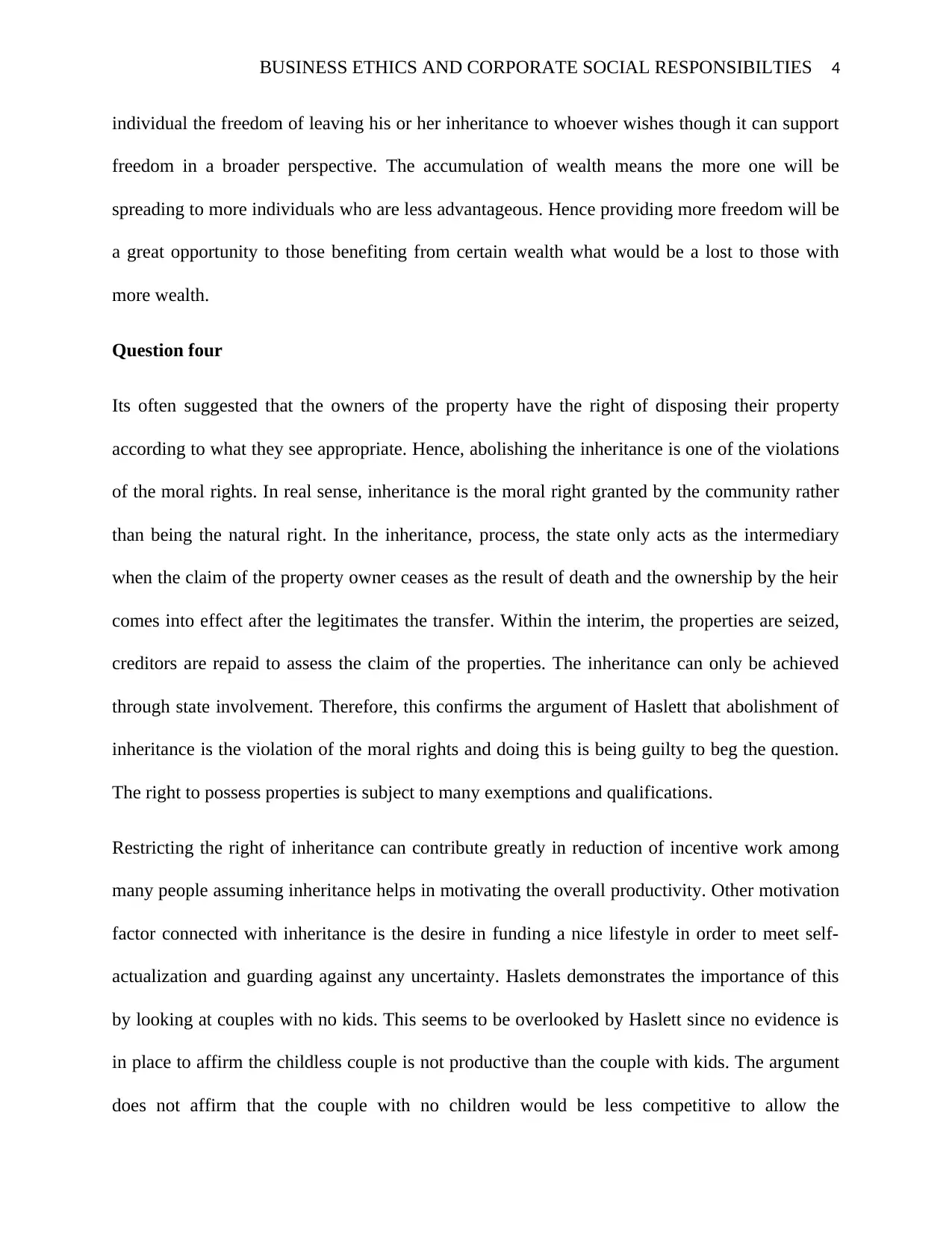
BUSINESS ETHICS AND CORPORATE SOCIAL RESPONSIBILTIES 4
individual the freedom of leaving his or her inheritance to whoever wishes though it can support
freedom in a broader perspective. The accumulation of wealth means the more one will be
spreading to more individuals who are less advantageous. Hence providing more freedom will be
a great opportunity to those benefiting from certain wealth what would be a lost to those with
more wealth.
Question four
Its often suggested that the owners of the property have the right of disposing their property
according to what they see appropriate. Hence, abolishing the inheritance is one of the violations
of the moral rights. In real sense, inheritance is the moral right granted by the community rather
than being the natural right. In the inheritance, process, the state only acts as the intermediary
when the claim of the property owner ceases as the result of death and the ownership by the heir
comes into effect after the legitimates the transfer. Within the interim, the properties are seized,
creditors are repaid to assess the claim of the properties. The inheritance can only be achieved
through state involvement. Therefore, this confirms the argument of Haslett that abolishment of
inheritance is the violation of the moral rights and doing this is being guilty to beg the question.
The right to possess properties is subject to many exemptions and qualifications.
Restricting the right of inheritance can contribute greatly in reduction of incentive work among
many people assuming inheritance helps in motivating the overall productivity. Other motivation
factor connected with inheritance is the desire in funding a nice lifestyle in order to meet self-
actualization and guarding against any uncertainty. Haslets demonstrates the importance of this
by looking at couples with no kids. This seems to be overlooked by Haslett since no evidence is
in place to affirm the childless couple is not productive than the couple with kids. The argument
does not affirm that the couple with no children would be less competitive to allow the
individual the freedom of leaving his or her inheritance to whoever wishes though it can support
freedom in a broader perspective. The accumulation of wealth means the more one will be
spreading to more individuals who are less advantageous. Hence providing more freedom will be
a great opportunity to those benefiting from certain wealth what would be a lost to those with
more wealth.
Question four
Its often suggested that the owners of the property have the right of disposing their property
according to what they see appropriate. Hence, abolishing the inheritance is one of the violations
of the moral rights. In real sense, inheritance is the moral right granted by the community rather
than being the natural right. In the inheritance, process, the state only acts as the intermediary
when the claim of the property owner ceases as the result of death and the ownership by the heir
comes into effect after the legitimates the transfer. Within the interim, the properties are seized,
creditors are repaid to assess the claim of the properties. The inheritance can only be achieved
through state involvement. Therefore, this confirms the argument of Haslett that abolishment of
inheritance is the violation of the moral rights and doing this is being guilty to beg the question.
The right to possess properties is subject to many exemptions and qualifications.
Restricting the right of inheritance can contribute greatly in reduction of incentive work among
many people assuming inheritance helps in motivating the overall productivity. Other motivation
factor connected with inheritance is the desire in funding a nice lifestyle in order to meet self-
actualization and guarding against any uncertainty. Haslets demonstrates the importance of this
by looking at couples with no kids. This seems to be overlooked by Haslett since no evidence is
in place to affirm the childless couple is not productive than the couple with kids. The argument
does not affirm that the couple with no children would be less competitive to allow the
Paraphrase This Document
Need a fresh take? Get an instant paraphrase of this document with our AI Paraphraser
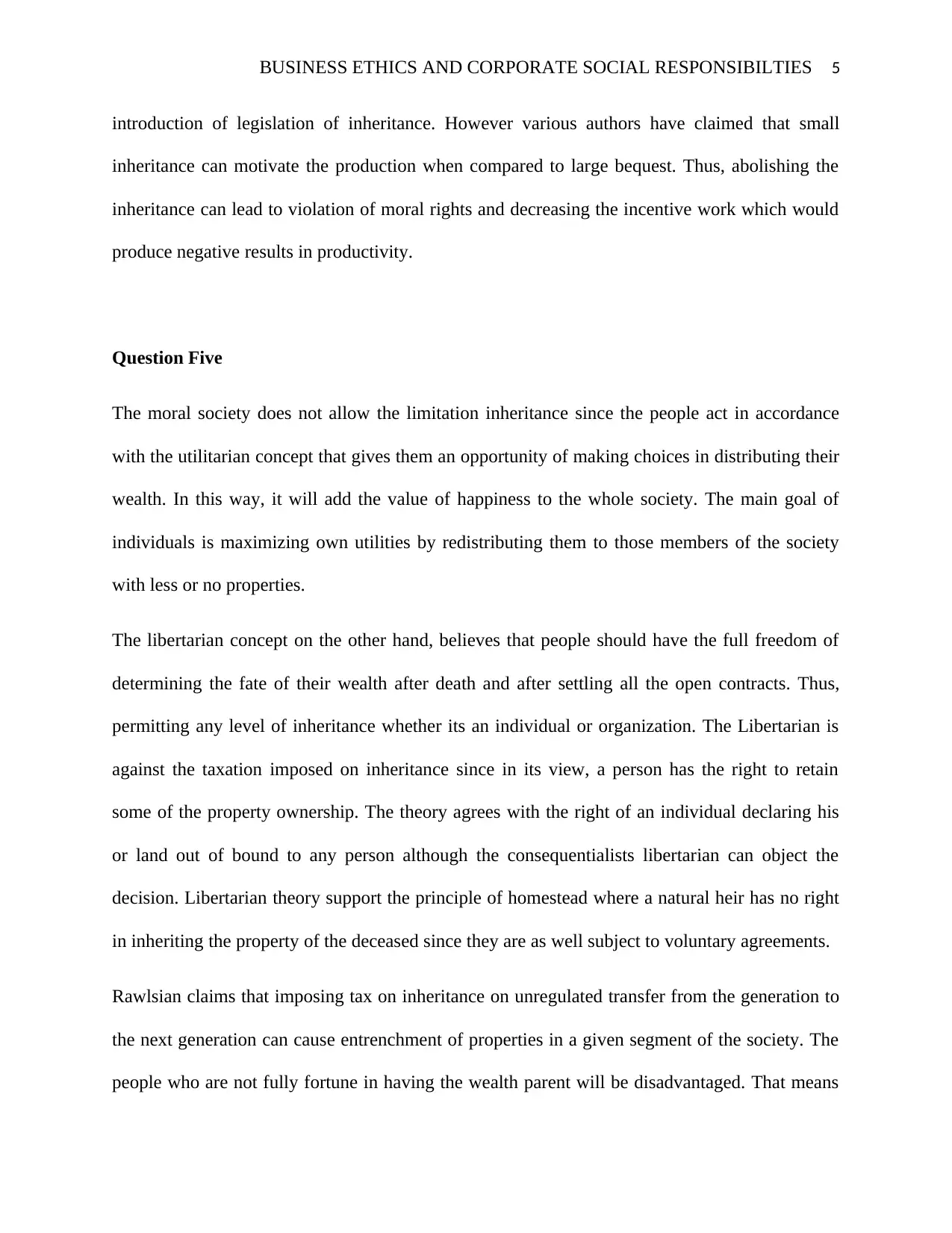
BUSINESS ETHICS AND CORPORATE SOCIAL RESPONSIBILTIES 5
introduction of legislation of inheritance. However various authors have claimed that small
inheritance can motivate the production when compared to large bequest. Thus, abolishing the
inheritance can lead to violation of moral rights and decreasing the incentive work which would
produce negative results in productivity.
Question Five
The moral society does not allow the limitation inheritance since the people act in accordance
with the utilitarian concept that gives them an opportunity of making choices in distributing their
wealth. In this way, it will add the value of happiness to the whole society. The main goal of
individuals is maximizing own utilities by redistributing them to those members of the society
with less or no properties.
The libertarian concept on the other hand, believes that people should have the full freedom of
determining the fate of their wealth after death and after settling all the open contracts. Thus,
permitting any level of inheritance whether its an individual or organization. The Libertarian is
against the taxation imposed on inheritance since in its view, a person has the right to retain
some of the property ownership. The theory agrees with the right of an individual declaring his
or land out of bound to any person although the consequentialists libertarian can object the
decision. Libertarian theory support the principle of homestead where a natural heir has no right
in inheriting the property of the deceased since they are as well subject to voluntary agreements.
Rawlsian claims that imposing tax on inheritance on unregulated transfer from the generation to
the next generation can cause entrenchment of properties in a given segment of the society. The
people who are not fully fortune in having the wealth parent will be disadvantaged. That means
introduction of legislation of inheritance. However various authors have claimed that small
inheritance can motivate the production when compared to large bequest. Thus, abolishing the
inheritance can lead to violation of moral rights and decreasing the incentive work which would
produce negative results in productivity.
Question Five
The moral society does not allow the limitation inheritance since the people act in accordance
with the utilitarian concept that gives them an opportunity of making choices in distributing their
wealth. In this way, it will add the value of happiness to the whole society. The main goal of
individuals is maximizing own utilities by redistributing them to those members of the society
with less or no properties.
The libertarian concept on the other hand, believes that people should have the full freedom of
determining the fate of their wealth after death and after settling all the open contracts. Thus,
permitting any level of inheritance whether its an individual or organization. The Libertarian is
against the taxation imposed on inheritance since in its view, a person has the right to retain
some of the property ownership. The theory agrees with the right of an individual declaring his
or land out of bound to any person although the consequentialists libertarian can object the
decision. Libertarian theory support the principle of homestead where a natural heir has no right
in inheriting the property of the deceased since they are as well subject to voluntary agreements.
Rawlsian claims that imposing tax on inheritance on unregulated transfer from the generation to
the next generation can cause entrenchment of properties in a given segment of the society. The
people who are not fully fortune in having the wealth parent will be disadvantaged. That means
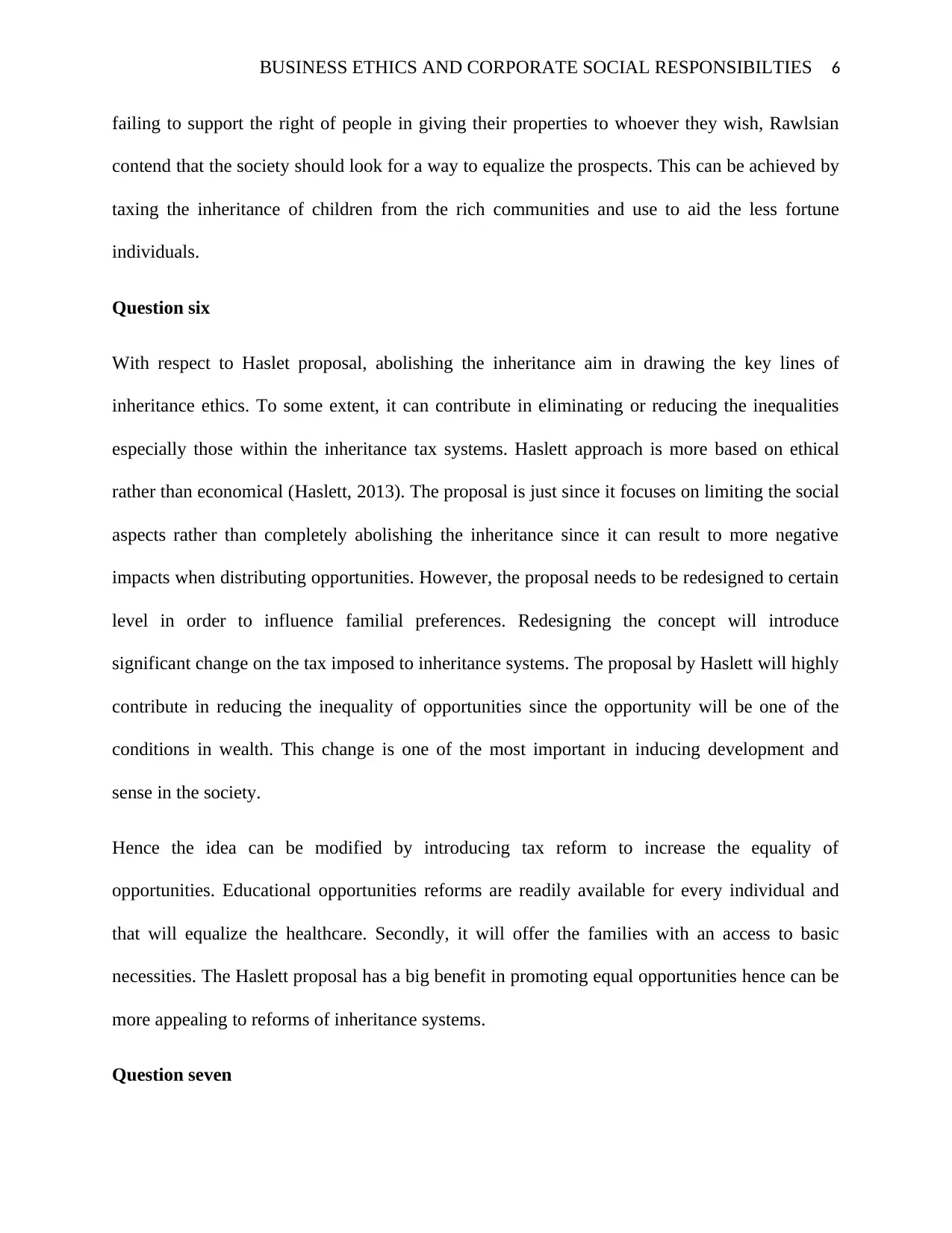
BUSINESS ETHICS AND CORPORATE SOCIAL RESPONSIBILTIES 6
failing to support the right of people in giving their properties to whoever they wish, Rawlsian
contend that the society should look for a way to equalize the prospects. This can be achieved by
taxing the inheritance of children from the rich communities and use to aid the less fortune
individuals.
Question six
With respect to Haslet proposal, abolishing the inheritance aim in drawing the key lines of
inheritance ethics. To some extent, it can contribute in eliminating or reducing the inequalities
especially those within the inheritance tax systems. Haslett approach is more based on ethical
rather than economical (Haslett, 2013). The proposal is just since it focuses on limiting the social
aspects rather than completely abolishing the inheritance since it can result to more negative
impacts when distributing opportunities. However, the proposal needs to be redesigned to certain
level in order to influence familial preferences. Redesigning the concept will introduce
significant change on the tax imposed to inheritance systems. The proposal by Haslett will highly
contribute in reducing the inequality of opportunities since the opportunity will be one of the
conditions in wealth. This change is one of the most important in inducing development and
sense in the society.
Hence the idea can be modified by introducing tax reform to increase the equality of
opportunities. Educational opportunities reforms are readily available for every individual and
that will equalize the healthcare. Secondly, it will offer the families with an access to basic
necessities. The Haslett proposal has a big benefit in promoting equal opportunities hence can be
more appealing to reforms of inheritance systems.
Question seven
failing to support the right of people in giving their properties to whoever they wish, Rawlsian
contend that the society should look for a way to equalize the prospects. This can be achieved by
taxing the inheritance of children from the rich communities and use to aid the less fortune
individuals.
Question six
With respect to Haslet proposal, abolishing the inheritance aim in drawing the key lines of
inheritance ethics. To some extent, it can contribute in eliminating or reducing the inequalities
especially those within the inheritance tax systems. Haslett approach is more based on ethical
rather than economical (Haslett, 2013). The proposal is just since it focuses on limiting the social
aspects rather than completely abolishing the inheritance since it can result to more negative
impacts when distributing opportunities. However, the proposal needs to be redesigned to certain
level in order to influence familial preferences. Redesigning the concept will introduce
significant change on the tax imposed to inheritance systems. The proposal by Haslett will highly
contribute in reducing the inequality of opportunities since the opportunity will be one of the
conditions in wealth. This change is one of the most important in inducing development and
sense in the society.
Hence the idea can be modified by introducing tax reform to increase the equality of
opportunities. Educational opportunities reforms are readily available for every individual and
that will equalize the healthcare. Secondly, it will offer the families with an access to basic
necessities. The Haslett proposal has a big benefit in promoting equal opportunities hence can be
more appealing to reforms of inheritance systems.
Question seven
⊘ This is a preview!⊘
Do you want full access?
Subscribe today to unlock all pages.

Trusted by 1+ million students worldwide
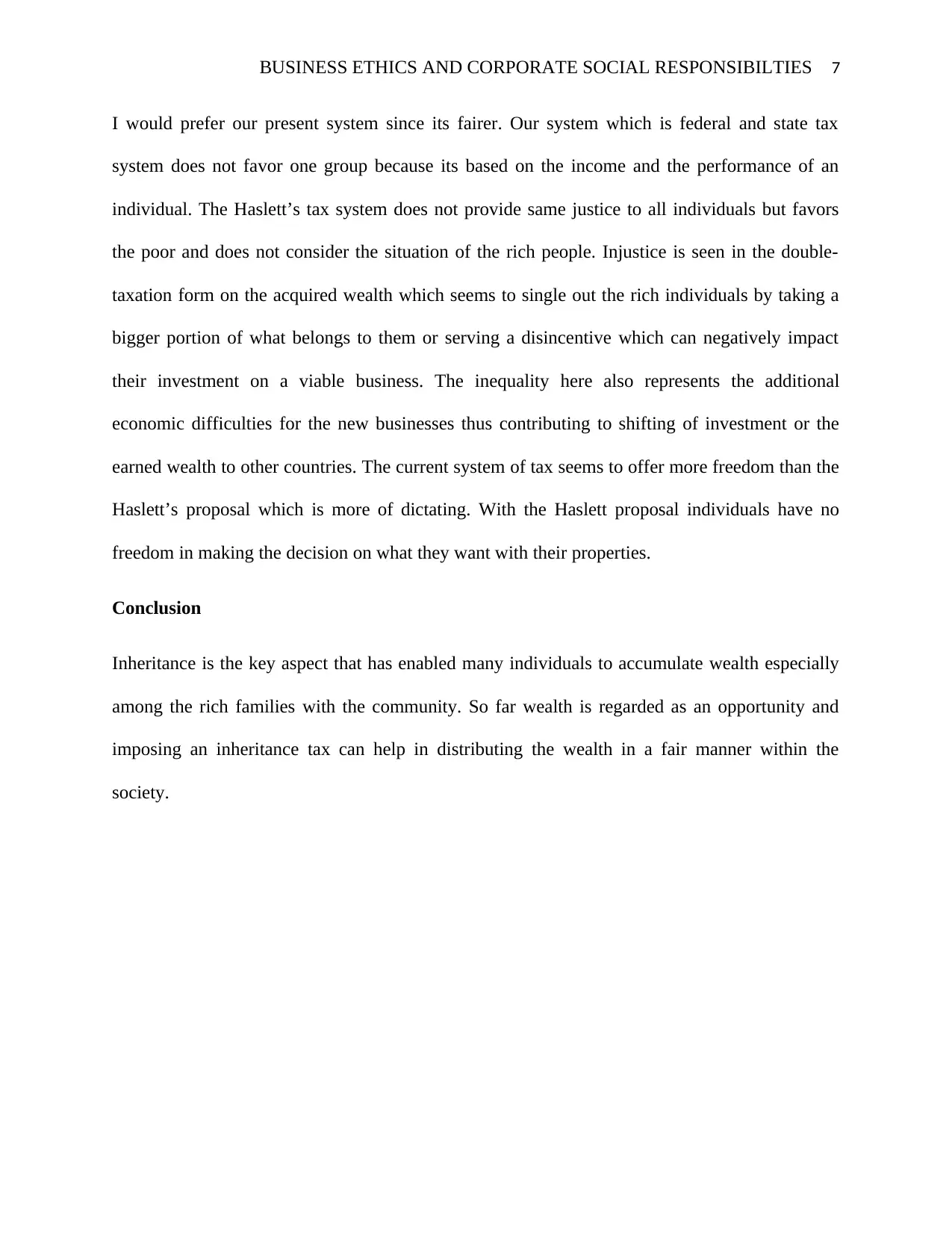
BUSINESS ETHICS AND CORPORATE SOCIAL RESPONSIBILTIES 7
I would prefer our present system since its fairer. Our system which is federal and state tax
system does not favor one group because its based on the income and the performance of an
individual. The Haslett’s tax system does not provide same justice to all individuals but favors
the poor and does not consider the situation of the rich people. Injustice is seen in the double-
taxation form on the acquired wealth which seems to single out the rich individuals by taking a
bigger portion of what belongs to them or serving a disincentive which can negatively impact
their investment on a viable business. The inequality here also represents the additional
economic difficulties for the new businesses thus contributing to shifting of investment or the
earned wealth to other countries. The current system of tax seems to offer more freedom than the
Haslett’s proposal which is more of dictating. With the Haslett proposal individuals have no
freedom in making the decision on what they want with their properties.
Conclusion
Inheritance is the key aspect that has enabled many individuals to accumulate wealth especially
among the rich families with the community. So far wealth is regarded as an opportunity and
imposing an inheritance tax can help in distributing the wealth in a fair manner within the
society.
I would prefer our present system since its fairer. Our system which is federal and state tax
system does not favor one group because its based on the income and the performance of an
individual. The Haslett’s tax system does not provide same justice to all individuals but favors
the poor and does not consider the situation of the rich people. Injustice is seen in the double-
taxation form on the acquired wealth which seems to single out the rich individuals by taking a
bigger portion of what belongs to them or serving a disincentive which can negatively impact
their investment on a viable business. The inequality here also represents the additional
economic difficulties for the new businesses thus contributing to shifting of investment or the
earned wealth to other countries. The current system of tax seems to offer more freedom than the
Haslett’s proposal which is more of dictating. With the Haslett proposal individuals have no
freedom in making the decision on what they want with their properties.
Conclusion
Inheritance is the key aspect that has enabled many individuals to accumulate wealth especially
among the rich families with the community. So far wealth is regarded as an opportunity and
imposing an inheritance tax can help in distributing the wealth in a fair manner within the
society.
Paraphrase This Document
Need a fresh take? Get an instant paraphrase of this document with our AI Paraphraser
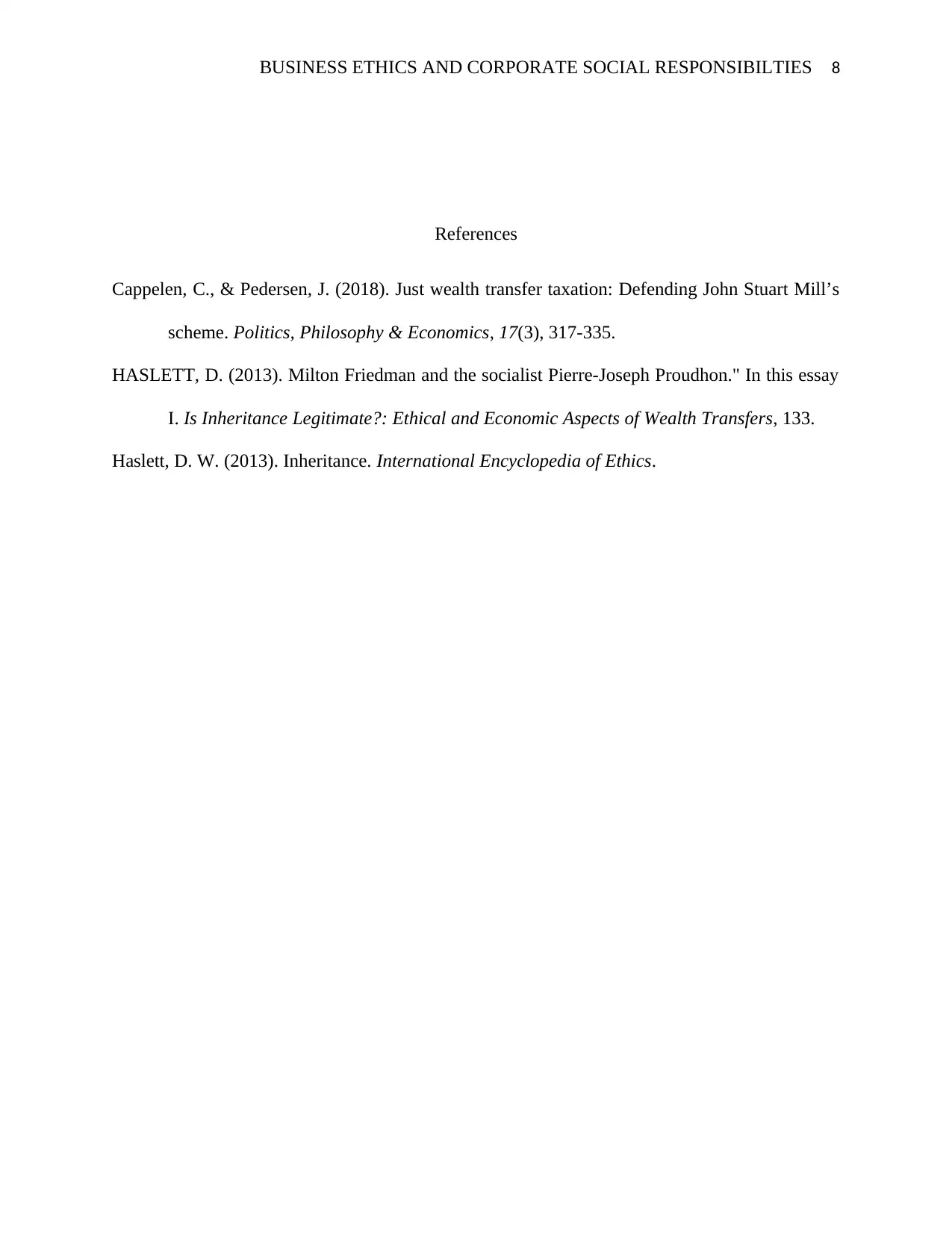
BUSINESS ETHICS AND CORPORATE SOCIAL RESPONSIBILTIES 8
References
Cappelen, C., & Pedersen, J. (2018). Just wealth transfer taxation: Defending John Stuart Mill’s
scheme. Politics, Philosophy & Economics, 17(3), 317-335.
HASLETT, D. (2013). Milton Friedman and the socialist Pierre-Joseph Proudhon." In this essay
I. Is Inheritance Legitimate?: Ethical and Economic Aspects of Wealth Transfers, 133.
Haslett, D. W. (2013). Inheritance. International Encyclopedia of Ethics.
References
Cappelen, C., & Pedersen, J. (2018). Just wealth transfer taxation: Defending John Stuart Mill’s
scheme. Politics, Philosophy & Economics, 17(3), 317-335.
HASLETT, D. (2013). Milton Friedman and the socialist Pierre-Joseph Proudhon." In this essay
I. Is Inheritance Legitimate?: Ethical and Economic Aspects of Wealth Transfers, 133.
Haslett, D. W. (2013). Inheritance. International Encyclopedia of Ethics.
1 out of 8
Related Documents
Your All-in-One AI-Powered Toolkit for Academic Success.
+13062052269
info@desklib.com
Available 24*7 on WhatsApp / Email
![[object Object]](/_next/static/media/star-bottom.7253800d.svg)
Unlock your academic potential
Copyright © 2020–2025 A2Z Services. All Rights Reserved. Developed and managed by ZUCOL.





